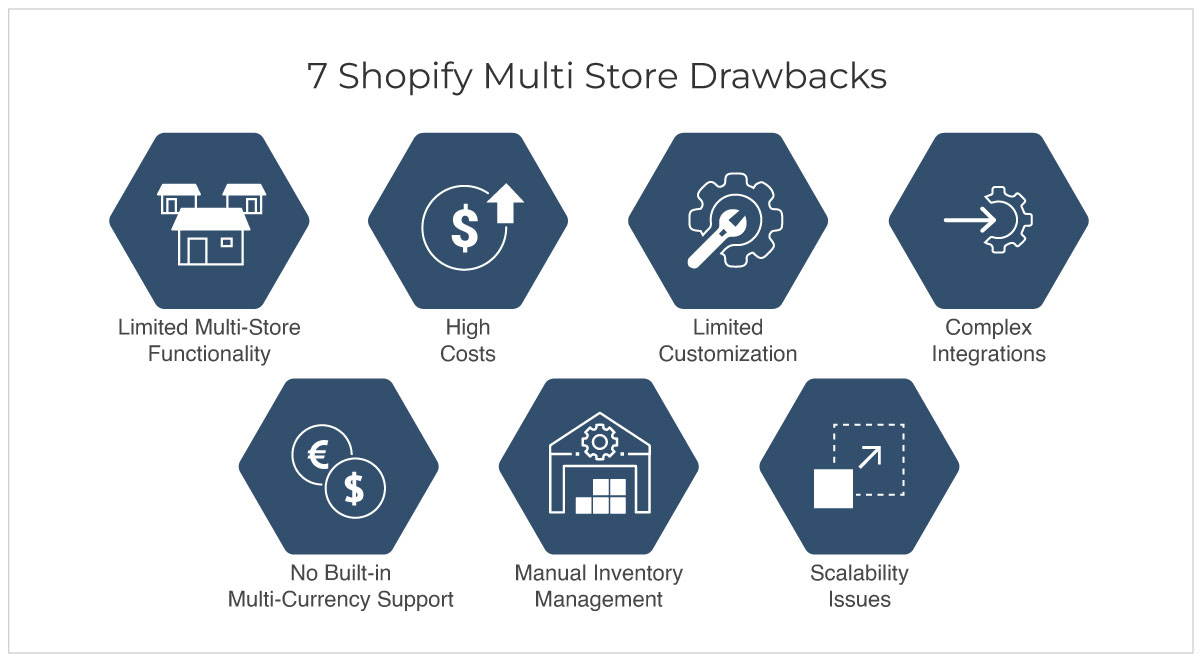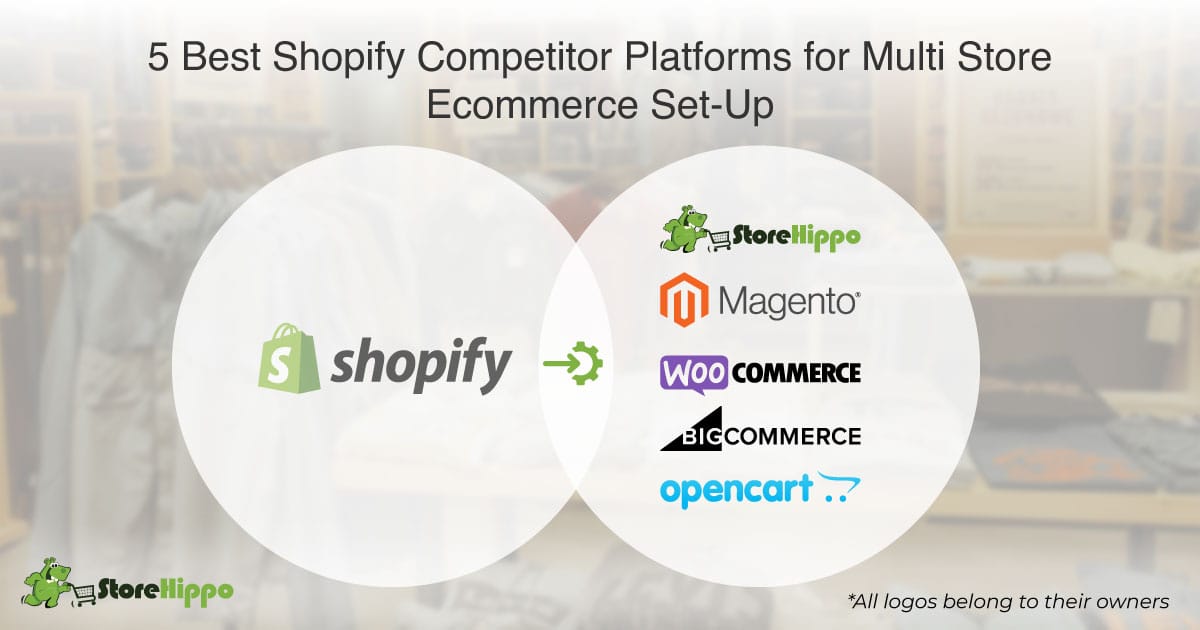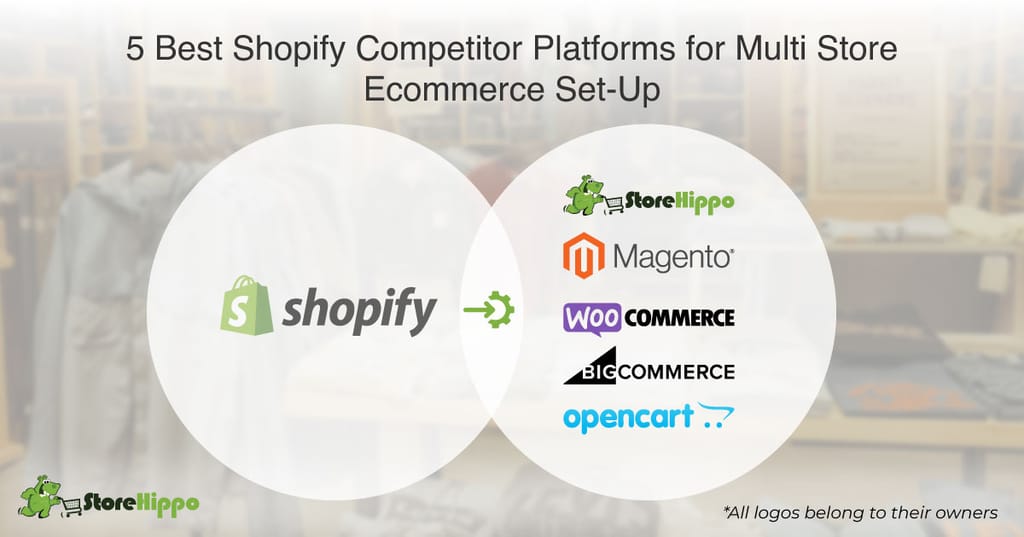Managing multiple online stores sounds like a dream, right? Well, not if you're using a platform that makes the process more of a nightmare than a dream. If you've been struggling with Shopify's multi-store limitations, you're not alone. Many businesses are on the hunt for a Shopify competitor that offers more flexibility and power. Lucky for you, we're diving into the top Shopify alternatives for multi-store eCommerce that can turn that nightmare into a seamless experience. Whether you're scaling up or just looking for the best Shopify multistore alternatives, we've got the solutions that can make multi-store management a breeze.
Let's uncover the real deal with Shopify's multi-store setup and then explore how StoreHippo, Magento, WooCommerce, BigCommerce, and OpenCart stack up. Ready for a smoother, smarter multi-store journey?
Let's begin by understanding the key issues with Shopify multistore solutions.
Table of Contents
7 Challenges of Managing Shopify Multistore Ecommerce Set-Up
Managing a multistore setup on Shopify can be complex and time-consuming. From handling multiple storefronts to integrating operations seamlessly, here are seven key challenges that enterprises often encounter.

- Limited Multi-Store Functionality: Shopify lacks a unified system for managing multiple stores, making it cumbersome to handle different storefronts.
- High Costs: Running multiple stores on Shopify can become costly due to separate subscription fees and transaction charges.
- Limited Customization: Customizing the look and feel of each store can be restrictive, making it difficult to create a unique brand experience across all stores.
- Complex Integrations: Integrating necessary tools and apps across multiple Shopify stores can be a complex and costly process.
- No Built-in Multi-Currency Support: Shopify does not offer built-in support for multi-currency across different stores, limiting global reach.
- Manual Inventory Management: Synchronizing inventory across multiple Shopify stores is often a manual process, prone to errors.
- Scalability Issues: Shopify’s multi-store setup can struggle with scalability, particularly for larger enterprises seeking to expand quickly.
These drawbacks can be both frustrating and restrictive for enterprises, often leading them to explore Shopify competitors that offer more robust multistore solutions.
5 Best Shopify Multistore Alternatives For Indian Enterprises
Indian enterprises looking for more flexibility and control in managing multiple stores need robust alternatives to Shopify. These platforms come equipped with features designed to address Shopify's limitations, offering a more tailored and seamless multistore experience.
Here are the 5 best multistore platforms tailored to meet the diverse needs of Indian businesses.
1. StoreHippo
StoreHippo is a cutting-edge multi store ecommerce platform for enterprises designed specifically for enterprises and stands out as an ideal Shopify competitor for businesses aiming to expand their online presence without being hindered by the typical limitations of Shopify's multi-store setup. It provides a comprehensive solution to manage and scale multiple stores effortlessly from a single, centralized dashboard. With its advanced features and intuitive interface, StoreHippo empowers businesses to create, customize, and operate various storefronts seamlessly, offering the flexibility and control required for diverse and complex eCommerce strategies.
Pros:
- StoreHippo offers an inbuilt multi-storefront solution designed specifically for enterprise B2B, B2C , D2C, B2B2C, Quick commerce, hyperlocal commerce and any other businesse models, allowing you to add and manage any number of storefronts through a common central dashboard, making it one of the best Shopify multistore alternatives.
- It enables you to build stores based on various criteria such as customer type, products, and location, with extensive customization options using a drag-and-drop builder and various themes, eliminating the need for advanced coding.
- Each storefront can be customized with unique designs, product catalogs, languages, payment solutions, shipping options, pricing, and promotions, offering versatility and a tailored shopping experience.
- Sub-stores can be seamlessly integrated with payment gateways, shipping partners, and third-party tools, streamlining the management process across multiple stores and ensuring smooth operations.
- Built in marketing tools and discount engine help in creating store-specific marketing strategies for growth.
- It supports multi-currency and multi-language options to cater to a global audience, enhancing international reach and improving customer experience on each storefront. What makes it the best shopify competitor is its ability to add store-specific language and currency options, enabling you to offer a more localized shopping experience.
- You can assign unique URLs to each sub-store for better branding and recognition, which helps in differentiating your various stores.
- StoreHippo also allows you to build unique apps for each sub-store with its built-in mobile apps builder.
- The platform simplifies inventory management with real-time updates and automatic synchronization across all stores, ensuring consistency, reducing errors, and saving time.
- The pricing overrides feature lets you offer the same products at different prices across various sub-stores, adding flexibility to your pricing strategies and catering to different market segments.
- Designed for scalability, StoreHippo enables growth and market expansion, making it the best Shopify multistore alternative for enterprises in India.
Cons:
- Multi store set up is not supported in entry level plans so you have to opt for higher subscription plans.
- Offers POS integration only through third-party integrations
2. Magento
Magento is a powerful open-source eCommerce platform known for its flexibility and extensive customization options. It stands as a strong Shopify competitor, especially for businesses that require a highly customizable multi-store setup. As one of the top Shopify alternatives for multi-store eCommerce, Magento offers a robust feature set that caters to the complex needs of large enterprises.
Pros:
- Highly customizable, allowing for tailored multi-store solutions specific to business needs, making it one of the best Shopify multistore alternatives.
- Offers an extensive range of extensions available for marketplace, multi-store, and advanced setups, positioning it as a strong Shopify competitor.
- Provides strong support for managing large product catalogs, offering scalability suitable for growing enterprises.
- Flexible enough to handle both B2B and B2C eCommerce models, making it a versatile multi-store eCommerce platform for enterprises.
- Backed by a large developer community, providing resources and plugins that enhance multi-store functionality and integration.
Cons:
- Complex setup process requires significant development expertise, which can be challenging.
- Expensive to maintain, with costs increasing due to hosting, development, and ongoing maintenance.
- Resource-intensive, potentially causing slower performance and higher hosting costs, making it a less efficient Shopify competitor.
- Requires regular updates and patches, adding to ongoing maintenance efforts, which can be labor-intensive for businesses used to more streamlined Shopify alternatives.
3. WooCommerce
WooCommerce, built on the WordPress platform, offers a flexible and user-friendly solution for small to medium-sized businesses looking for simple multistore setup. Its seamless integration with WordPress gives it an edge, especially for those already using the platform, providing a smooth and intuitive setup process. As a Shopify competitor, WooCommerce is one of the top solutions for businesses looking for a more straightforward multi-store setup. It combines simplicity with the powerful flexibility of WordPress making it a viable option for those seeking Shopify multi-store ecommerce alternatives.
Pros:
- Integrates seamlessly with WordPress, offering a familiar interface for managing multiple stores efficiently.
- Offers a variety of plugins to enhance multi-store functionality, making it adaptable for diverse business needs and one of the good Shopify alternatives for multi store ecommerce.
- Supports different product catalogs and pricing structures for each store, allowing for tailored multi-store setups.
- Provides flexibility to add unique themes and customizations for each storefront, creating distinct brand experiences.
- Cost-effective solution for small to medium-sized businesses, with many free or affordable plugins for multi-store management.
Cons:
- Requires multiple plugins for advanced multi-store functionality, which can complicate management and increase maintenance, making it a complex multi store ecommerce platform for enterprises.
- Limited built-in multi-store support, often requiring custom development or third-party solutions.
- Performance can be affected as the number of products and stores grows, potentially leading to slower site speeds.
- Inventory management across multiple stores can be challenging without additional plugins, increasing the risk of errors.
- Lacks native support for multi-currency and multi-language options, requiring extra plugins or customizations for global reach. Making it a less used Shopify competitor for Indian enterprises planning global foray.
4. BigCommerce
BigCommerce is a fully hosted eCommerce platform crafted specifically for growing businesses, providing the tools and scalability needed to thrive in a competitive market. With its robust, built-in multi-store functionality, BigCommerce stands out as a Shopify competitor, offering a comprehensive and seamless solution for enterprises. This platform is designed to cater to businesses seeking a reliable multi-store setup, delivering the performance and flexibility required to manage and expand multiple storefronts effortlessly.
Pros:
- BigCommerce's 'Storefront' feature allows for easy management of multiple stores, streamlining the multi-store eCommerce process.
- BigCommerce offers built-in multi-store functionality, allowing businesses to manage multiple storefronts from a single dashboard, making it a strong Shopify competitor for multi-store management.
- The platform provides robust scalability, and can handle increased traffic and growing product catalogs, which is essential for enterprises seeking Shopify alternatives for multi-store ecommerce.
- It includes extensive customization options for each storefront, allowing businesses to create unique shopping experiences and cater to different customer segments.
- Seamless integrates with various payment gateways and third-party tools, simplifying the process of running multiple stores efficiently.
- The platform comes with built-in SEO tools and marketing features, making it one of the best Shopify multistore alternatives for driving organic traffic.
Cons:
- Can become expensive as businesses scale up, with higher costs for advanced features and additional storefronts, making it a pricier Shopify competitor.
- While it offers customization, the options are somewhat limited compared to platforms like Magento, StoreHippo etc. which may restrict businesses looking for highly tailored multi-store setups.
- The platform charges transaction fees on certain plans, which can add up and impact profitability, particularly for high-volume stores, making it a less attractive Shopify competitor in terms of cost-effectiveness.
- Multi-currency support is not as seamless as some other platforms, requiring additional workarounds to cater to international customers.
- Setting up a complex multi-store environment can still require a learning curve, making it a less opted StoreHippo competitor as compared to other platforms.
5. OpenCart
OpenCart is an open-source eCommerce platform that provides businesses with the flexibility to create and manage customized multi-store setups. Known for its user-friendly interface and extensive range of features, OpenCart is a cost-effective Shopify competitor. It's particularly suited for businesses with technical expertise, offering the freedom to tailor their stores to fit specific requirements. OpenCart allows businesses to craft a tailored shopping experience without the hefty price tag, making it a popular choice.
Pros:
- OpenCart offers full flexibility and customization options, allowing businesses to create a multi-store environment that perfectly aligns with their unique needs, making it one of the best Shopify multistore alternatives.
- It is a cost-effective solution for multi-store setups, with the core platform being free and a wide range of affordable plugins available.
- With centralized management of multiple stores, it allows businesses to control different storefronts, catalogs, and customer groups from a single admin interface.
- The platform supports a variety of extensions and modules.
- OpenCart has a lightweight framework, which means it can run smoothly even on basic hosting plans, offering a more cost-efficient option compared to other Shopify alternatives for multi-store eCommerce.
Cons:
- OpenCart requires technical knowledge for installation, customization, and ongoing maintenance, which can be a challenge for businesses looking for easier Shopify competitors with built-in multi-store features.
- While the platform is free, the total cost can increase with the need for various plugins and extensions to achieve desired multi-store functionality, making it less cost-effective in the long run.
- The platform lacks some advanced built-in multi-store features that competitors offer, often requiring third-party extensions to fill in the gaps, which can complicate setup and management.
- OpenCart’s performance can suffer as the business scales, particularly if the platform is not optimized or if too many plugins are installed, potentially leading to slower load times.
- Support is community-based, which means businesses might face delays in getting help for complex multi-store setups, unlike more established Shopify alternatives for multi store ecommerce that offer dedicated support services.
Conclusion
While Shopify is a popular choice for standard eCommerce operations, businesses seeking a more versatile and scalable multi-store setup often need a platform that goes beyond its limitations. For enterprises that require robust multi-store functionality, seamless integrations, and advanced customization options, StoreHippo emerges as the best Shopify multistore alternative. StoreHippo offers an all-in-one solution with built-in features tailored for managing complex multi-store environments, making it ideal for businesses looking to expand and cater to diverse customer segments.
If you're in search of Shopify Alternatives for multi store ecommerce, that provide centralized control, extensive customization, and support global expansion with multi-currency and multi-language options, StoreHippo is the perfect choice.
Ready to take your multi-store eCommerce business to the next level with a superior Shopify competitor? Discover StoreHippo's fully managed solutions and start your 14-day free trial today!





















Leave A Comment